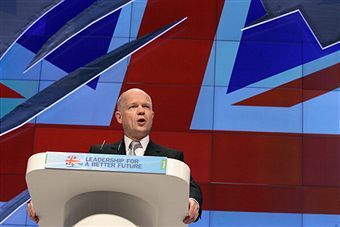 William Hague’s conference speech caps a revival in his political fortunes, and it also
showed how far the government has come since the pre-election period, when Tory foreign policy was indistinct. After one year in office, the government’s roster of foreign policy
achievements is noteworthy.
William Hague’s conference speech caps a revival in his political fortunes, and it also
showed how far the government has come since the pre-election period, when Tory foreign policy was indistinct. After one year in office, the government’s roster of foreign policy
achievements is noteworthy.
The coalition has overseen institutional innovations in the form of the National Security Council and organisational improvements at the Foreign Office. Embassies are opening, not closing. Diplomats are again being taught traditional skills, not trying to follow the latest foreign policy fad. Cooperation between DfiD and the Foreign Office is also much better than it was under Labour, with Andrew Mitchell and William Hague conferring regularly on key issues.
Policy-wise, the government has also set off in new directions. It has prioritised links with rising powers like India and Brazil and — most crucially — developed a more coherent response to the “Arab Spring” than many EU states. In Libya, Britain showed, in the Foreign Secretary’s words, “resolve” and “prevented a terrible massacre and a humanitarian catastrophe.” Learning the lessons of past wars, David Cameron ensured that the action was legal and had international support.
But, there are a number of foreign policy issues that remain confused. Afghan policy looks no more sensible now than it did before. There is a deadline for British withdrawal, but nobody believes that NATO forces will hand over power to a self-sustaining local force, or that anything new will make the Taliban willing to negotiate. Pakistan, too, has not been a particular focus for the government, despite the country’s importance. While the government was bold in North Africa, it has stuck its head in the sand on the Middle East peace process as the Palestinians sought UN support for their cause. And David Cameron’s visit to Russia did not “reset” relations and was seen by many in Moscow as endorsing Vladimir Putin’s return to power.
But, of the many things Hague mentioned in his conference speech, his references to the EU will likely get the most attention, and criticism. The Foreign Secretary pandered to the anti-EU instincts of the country, but stopped short of doing what Eurosceptics in his party really want: a referendum on Britain’s EU membership. The government’s foreign policy has been more multilateral, more collaborative with a range of countries, more constructive inside the EU and bolder militarily than many people thought it would be. But, the problems inside the Eurozone and the growing chorus of Euroscepticism are threatening to dominate the foreign policy discussion.






Comments